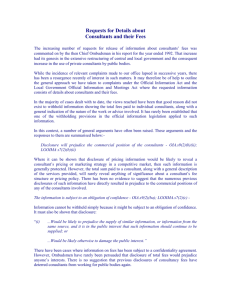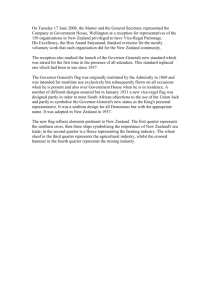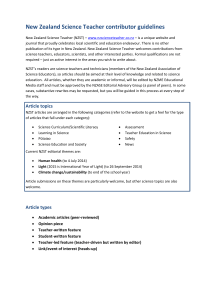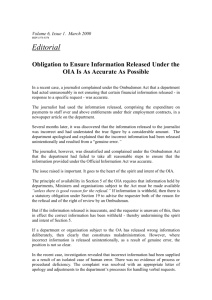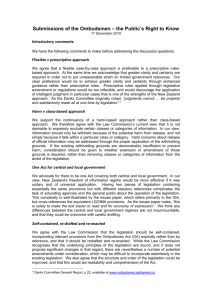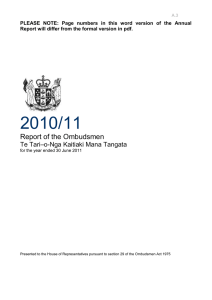DOC
advertisement
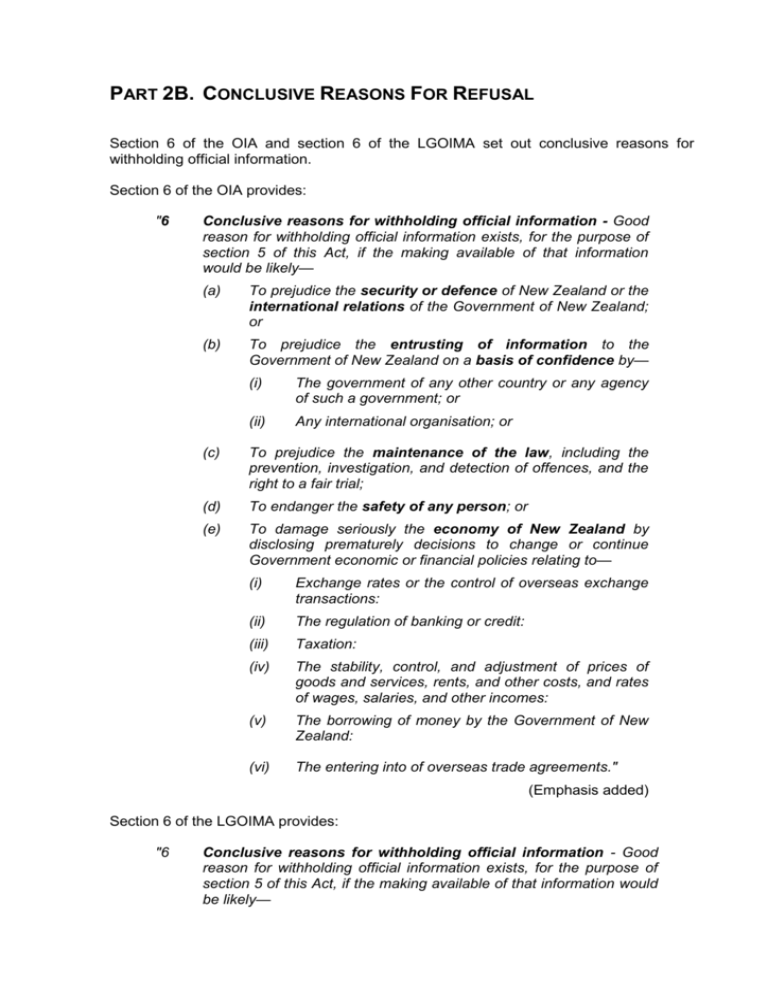
PART 2B. CONCLUSIVE REASONS FOR REFUSAL Section 6 of the OIA and section 6 of the LGOIMA set out conclusive reasons for withholding official information. Section 6 of the OIA provides: "6 Conclusive reasons for withholding official information - Good reason for withholding official information exists, for the purpose of section 5 of this Act, if the making available of that information would be likely— (a) To prejudice the security or defence of New Zealand or the international relations of the Government of New Zealand; or (b) To prejudice the entrusting of information to the Government of New Zealand on a basis of confidence by— (i) The government of any other country or any agency of such a government; or (ii) Any international organisation; or (c) To prejudice the maintenance of the law, including the prevention, investigation, and detection of offences, and the right to a fair trial; (d) To endanger the safety of any person; or (e) To damage seriously the economy of New Zealand by disclosing prematurely decisions to change or continue Government economic or financial policies relating to— (i) Exchange rates or the control of overseas exchange transactions: (ii) The regulation of banking or credit: (iii) Taxation: (iv) The stability, control, and adjustment of prices of goods and services, rents, and other costs, and rates of wages, salaries, and other incomes: (v) The borrowing of money by the Government of New Zealand: (vi) The entering into of overseas trade agreements." (Emphasis added) Section 6 of the LGOIMA provides: "6 Conclusive reasons for withholding official information - Good reason for withholding official information exists, for the purpose of section 5 of this Act, if the making available of that information would be likely— Part 2B -2- (a) To prejudice the maintenance of the law, including the prevention, investigation, and detection of offences, and the right to a fair trial; or (b) To endanger the safety of any person." (Emphasis added) Conclusive withholding grounds The first point to note in respect of the reasons for refusal set out in section 6 is that, unlike the reasons for refusal set out in section 9, there is no requirement to consider whether the interest in withholding is outweighed by countervailing public interest considerations. Effectively, the Act deems it to be in the public interest for information to be withheld where the requirements of section 6 have been met. In this regard, it is helpful to bear in mind the comments of the Danks Committee in its general report which led to the enactment of the OIA:1 "Interests of the Country as a Whole 35. One general area for which it is generally accepted that protection is needed, can be collectively described under a ‘nation interests’ heading. It includes such fields as security, defence, and international relations. We consider that the maintenance of law and order and the substantial economic interests of New Zealand also merit assurances of protection, so that government can operate in the bests interests of the public as a whole. 36. In police operations and the general maintenance of law and order, the requirements for effective action, protection of the due process of law, and upholding of basic individual rights combine in many instances to call for protection. 37. The nation's economic interests have always demanded that it should be possible to protect the processes of negotiation and fiscal regulation. The ‘intangible capital of economic organisation’ is seriously open to damage if options are prematurely canvassed or predictions come to be self-fulfilling. Internationally, economic affairs are equally susceptible to loss of confidence and actual damage if confidentiality is unable to protect negotiations with overseas governments or organisations. 38. It is also widely recognised that much of the information under these headings can be sensitive not so much for what it reveals as for the need to protect its sources. The then Chief Ombudsman, in his report on the Security Intelligence Service (1976, p20), reached the conclusion that information received by New Zealand from its friends is of major importance in the political, economic and strategic policy making fields. It is in the national interest to continue to get as much of this information as possible. While a good deal of it is in the public domain, some is not. Much of the latter is provided on the clear understanding that it will be afforded in New Zealand substantially the same degree of security as it is 1 “Towards Open Government”, 1980, page 17, paragraphs 35-38 Part 2B -3- afforded in the country of origin. These considerations have led us to propose that in the areas described in this section… protection from disclosure shall be absolute if disclosure is likely to prejudice essential interests including the continued flow of information." When does section 6 apply? In practice, there are two questions which must be asked when considering whether section 6 applies to a particular request: (i) Precisely how would disclosure of the information requested prejudice an interest protected in subsections (a) to (e)? It is not sufficient to simply assert that disclosure of the information will have a prejudicial effect. The public sector agency must be able to identify, with sufficient particularity, the nature of the prejudicial effect and explain how such prejudice will occur in order to meet the tests for withholding in section 6. (ii) Would the predicted prejudice be "likely" to occur? The phrase "would be likely" requires more than mere possibility that disclosure may have a prejudicial effect. The Court of Appeal has interpreted the phrase "would be likely" to mean "a serious or real and substantial risk to a protected interest, a risk that might well eventuate”.2 This is a lower standard than that required by the reasons for refusal in section 9 of the Act, where information can be withheld "if, and only if, the withholding is necessary" to avoid prejudice to one of the interests identified as requiring protection. In assessing the nature of the predicted prejudice and its likelihood should the information at issue be made available, both the content of the information and the context in which it was generated can be relevant. In most cases, the following factors should be considered, irrespective of which subsection has been advanced as the reason for refusal: (a) "Who" generated or supplied the information at issue? (b) "What" does the information reveal? (c) In what "context" was the information generated or supplied? (d) "Timing" - where the information relates to a particular process, what stage had been reached at the time the request was received and what will happen next? 2 Commissioner of Police v Ombudsman [1988] 1 NZLR 385, 391 Part 2B -4- Casenotes illustrating the application of section 6 Guidance as to the approach taken to the application of section 6(a)-(e) in particular cases can be found in the following Case Notes of the Ombudsmen. Section 6(a) - National Defence and Security The application of section 6(a) of the Act was considered by the Ombudsmen in relation to decisions made by certain agencies to withhold: (i) reports on environmental damage resulting from French nuclear testing; 3 (ii) information relating to Rt. Hon Mike Moore’s candidacy for Director-General of the World Trade Organisation;4 and (iii) an application for the initiation of an anti-dumping investigation.5 Section 6(b) – Entrusting of Information in Confidence to the Government of New Zealand The application of section 6(b) of the Act was considered by the Ombudsmen in relation to decisions made by certain agencies to withhold: (i) papers presented to the New Zealand Government leading to the decision to withdraw troops from Bosnia;6 and (ii) information relating to the proposed visit to New Zealand in 1985 of USS Buchanan.7 Section 6(c) – Maintenance of the Law The application of section 6(c) of the Act was considered by the Ombudsmen in relation to decisions made by certain agencies to withhold: (i) information about the alleged sexual violation of a hospital patient by a staff member - the information was withheld pending the outcome of proceedings on the basis of the right of the accused to a fair trial;8 (ii) Police details of the “diversion” of an applicant for a taxi driver’s licence, requested by the Land Transport Safety Authority;9 and, (iii) details of APEC security arrangements.10 The “11th Compendium of Case Notes of the Ombudsmen” (1998) Case No. W34780, 60 The “12th Compendium of Case Notes of the Ombudsmen” (2000), Case No. W42548, 77 5 Above n4, Case No. W41825, 79 6 The “11th Compendium of Case Notes of the Ombudsmen” (1998) Case No. W35756, 61 7 Above n6, Case No. W37800, 62 8 Above n6, Case No. W35205, 63 9 Above n4, Case No. W40692, 83 10 Above n4, Case No’s. W43282 and W43600, 85 3 4 Part 2B -5- Section 6(d) – Endangering the Safety of any Person The application of section 6(d) of the Act was considered by the Ombudsmen in relation to the decision made by an agency to withhold a child’s prize-giving results.11 The child had requested that the results not be provided to a non-custodial parent because of use made by that parent of other information. Section 6(e) – Serious Damage to the Economy of New Zealand The application of section 6(e) of the Act was considered by the Ombudsmen in relation to the decision made by an agency to withhold information about producer board reforms likely to damage seriously the economy of New Zealand in relation to overseas trade agreements.12 11 12 Above n4, Case No. W39955, 92 Above n4, Case No W41506, 85


